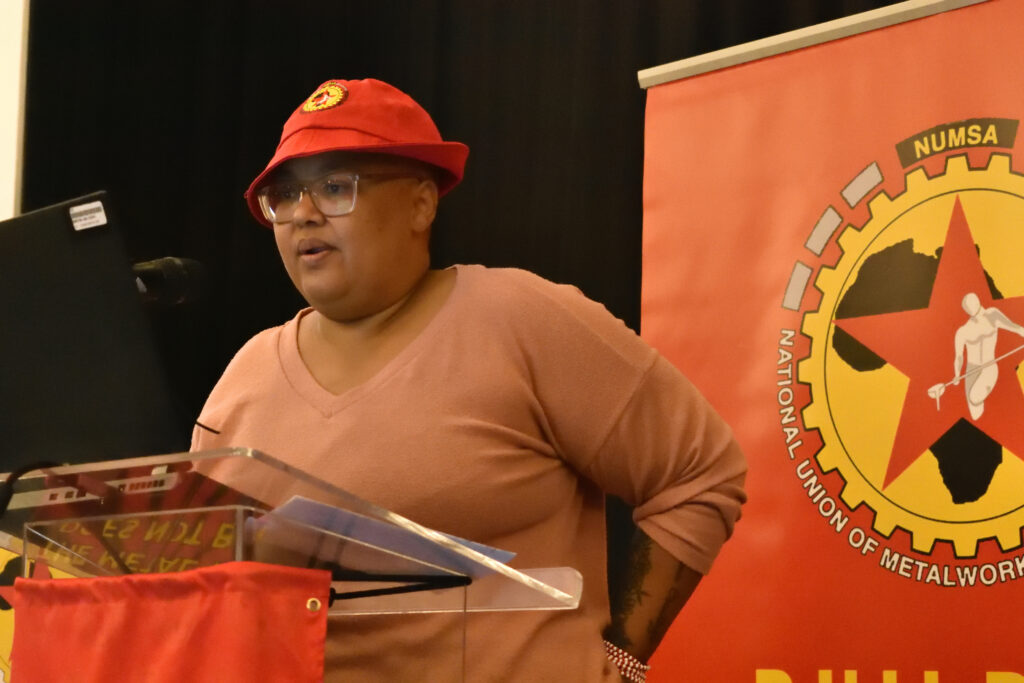20 April, 2022National bargaining conferences provide union negotiators and shop stewards a chance to analyze and shape strategies for negotiations. For the metalworkers, they are also training and knowledge sharing events for experienced negotiators and shop stewards who will be going into the important union task of collective bargaining for the first time.
IndustriALL Global Union affiliate, the National Union of Metalworkers of South Africa (NUMSA) held a national bargaining conference on 11-13 April in Boksburg, near Johannesburg, to discuss the metalworkers’ bargaining strategy for the 2022 round of negotiations. The conference focused on living wages, benefits, and conditions of service.
The conference was attended by 288 delegates from the sectors that NUMSA organizes including automotive, motor components, garages, and tyre manufacturing. Other key sectors are the energy sector that covers workers from the power utility Eskom, and the metals and engineering sectors. In-house agreements where the union allowed some companies to negotiate separate house agreements – outside of central bargaining – were also discussed.
Speakers at the conference were drawn from the department of mineral resources and energy, Statistics South Africa, and research institutions that included the Trade and Industrial Policies Strategies (TIPS) and provided the country’s social and economic context and the implications for collective bargaining.
The national bargaining conference made recommendations on the various sectors. For example, on the auto sector, the conference concluded that the transition from the internal combustion engine to electrical vehicles must not lead to job losses but should instead protect workers’ interests as per government policies that included the 2025 automotive masterplan. Further, local procurement of some components remained key for the survival of some industries on the value chain.
On Just Transition, the union says this must be done in a sustainable and affordable way that considered the country’s energy mix of coal, nuclear and renewable energy. Further, coal power stations must not be shut down without guarantees of job security and a Just Transition plan that protected workers and human rights. The conference urged Eskom to stop power outages that have led to huge losses for the economy.
On state-owned enterprises, the conference recommended wage increases that cushioned against inflation of at least 7 per cent at Eskom while wage arrears should be paid to workers at South Africa Airways and Denel. The conference rejected the privatization of state-owned enterprises, arguing that they produced public goods.
In the steel and engineering sector, the union said the steel masterplan must be preserved to promote manufacturing and stop the deindustrialization of the sector which is leading to job losses.
Irvin Jim, NUMSA general secretary said:
“This conference is a platform for us to discuss not only how we must position ourselves organizationally, but also how we envision organizing and mobilizing beyond this round of negotiations to consolidate workers’ bargaining power.
“The national bargaining conference’s task is to continuously reposition NUMSA’s bargaining strategies in relation to the engagement with the Fourth Industrial Revolution which has moved beyond globalization in the restructuring of the workplace. However, the implementation of the latest technologies without careful consideration for the Just Transition and the future of work puts existing jobs under threat.”
“The robust discussions at the national bargaining conference show that NUMSA is embracing the transformation that is taking place in the world of work and ensuring that its shop stewards are well-equipped with negotiation and bargaining skills and can effectively use digital technologies to understand industry trends and other critical information on complex supply chains. This dynamic approach is critical to collective bargaining and ensures that workers retain benefits and living wages,” says Paule France Ndessomin, IndustriALL regional secretary for Sub Saharan Africa.







